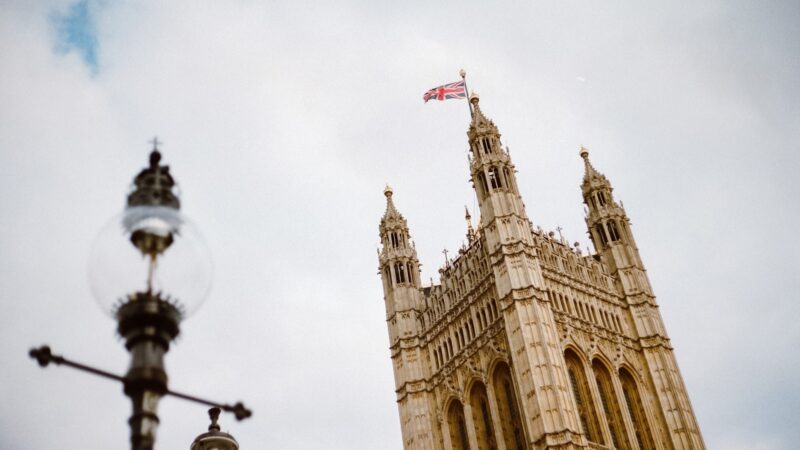The Monarchy isn’t Britain’s Soul
Increasingly pessimistic, this article may very well just be me being unwarrantedly critical. However, there is nothing like a smidgen of conflict to get people interested in reading what we have to say; here goes nothing, I’m going to disagree with Daniel Hawker.
Let me be clear: I am not a republican, nor am I indifferent to the monarchy that we have. I also do not dislike either Edmund Burke or the late Sir Roger, having read works from both – and yet, I disagree with Mr Hawker’s recent commentary piece on the role of our monarchy. The King, or the Royal Family, isn’t ‘Britain’s Soul’, nor is it ‘our one national continuity’ (my emphasis, not Mr Hawker’s). Though, perhaps first I should commend what I think he has gotten right, and where we have common ground.
Our late Sovereign Lady was indeed an embodiment of moral courage and civic duty. I would go so far as to say she was a fantastic public figurehead for traditional, protestant Anglican Christianity. Likewise, it is indeed true that the more radical left want to tear down our traditional institutions, while the soft left want to turn them into glorified green-social democrat mouthpieces – we know. One could even go so far as to say that we should be vocally supportive of our King, or at least the institution of monarchy, perhaps solely on the basis that it annoys the right people.
Britain, however, is not the monarchy; Britain is a nation; a nation is a collective of people. What defines those people is what those people do – the customs and common practices, attitudes and values. The ‘soul’ of the British is our popular culture, or even our values (I would prefer the term religion), in how the British think and so how the British act. British people have generally enjoyed popular sovereignty and familiarity in regards to what is visibly around them. This is why the 2016 Brexit campaign focused on “take back control” and mass immigration changing our familiar towns and cities – against distant institutions on the continent. Nigel Farage did not invoke, at least not prominently, the idea that Brussels had taken power from the Queen.
It is not a good thing that we have a ‘personal connection’ to the Royal Family, or that we view the King as some kind of dad that we never had. It is not ‘trad’ to have the monarch be at the forefront of Britons’ minds; this is counterintuitive to a mystical, sacred monarchy. The word ‘mystical’ is, unsurprisingly, from the same root word as ‘mystery’; secret. How is it possible to maintain mysticism and a sacral quality if the King is supposed to seem intimate to us? How is it possible for the monarchy to be sacred if they appear ordinary? It is this attitude that was the root of the subsequent celebrification of the Royal Family, which has been disastrous. The King does not have to be #relevant to the everyday lives of British people.
There is a necessity in balancing civic involvement, mystical and sacred qualities, and representing public morality – if not a higher morality – that the Royal Family has a duty to pursue. Our King has to remain sufficiently far-off to be sacred. He also has to be visibly moral enough to be respected and involved publicly enough to maintain institutional confidence. Balancing what can be at odds with each other is not easy, but an overly-involved and relevant, though not in the progressive sense, monarchy, which I think, perhaps unconsciously, was guiding Mr Hawker’s thought, is not the right way forward.
If you want to discover and influence “Britain’s Soul”, turn away from institutions and towards the people. Institutions are important, vital even, but they are another subject to what Mr Hawker was trying to tackle. Turn towards what moral, dare I say even religious, forces are guiding everyday people, and what ordinary people do communally. The monarchy did not compel me to love my country, nor does it govern my every action; Jesus Christ does, and I pray in every beloved Book of Common Prayer service that we will only be quietly governed by our monarch. At the end of the day, I do not think that it is historically or presently accurate to pin our whole national being on one institution, albeit an important one, while that which is popular is effectively sidelined.
If you want to discover and influence ‘Britain’s Soul’, be practical, straightforward and actually change how people think and act; how people’s souls are actually oriented. Avoid placing too much emphasis on a single institution, especially when they do not govern our everyday lives. Some institutions ought to, like the Church (which has a presence in every community, I am told), and you may find that they are more relevant to the subject of souls. Other institutions currently hold too much sway over the developing souls of Britons, like schools – as opposed to parents. Other institutions try to suppress the outward signs of inward Graces in our souls, like the police. You will not make any progress in a ‘conservative revolution’ by having tunnel vision.











Private property and the environment: competing or reconcilable objectives?
When it comes to the question of the environment and what to do about it, there are a number of assumptions—the outcome of which does, for the most part, map nicely—with respect to who will be saying what about it. For example, that a Leftist is more inclined to refer to themselves as an ‘environmentalist’, coupling their ideological convictions of social progressivism with concern for ecological damage, is, for the most part, true. Equally, that a right-winger is less likely to refer to themselves as an ‘environmentalist’, is also, for the most part, true. I suspect that the inclination of the latter is more out of reaction to the prevailing Leftist narratives around environmental protection, rather than a genuine indifference or lack of concern around the matter considered in itself. Certainly, with respect to myself, as I refer to myself as both a Right-libertarian (of the more ‘reactionary’, as it’s often called, conservative inclination) and an ‘environmentalist’, I seek to present the case in favour of private property and environmental protection as being reconcilable, not hostile or competing, objectives. This I aim to do without too much of a foray into the dense political-philosophical and economic-statistical thicket, where one can get lost rather easily and squarely miss the point.
As a matter of first principles, it almost goes without saying that the Right-libertarian stance is one which emphasises the importance of private property, and therefore of property rights by default, in all human affairs. It is a case of ontological significance for the human being to be able to determine the boundaries and limits, the inclusion and the exclusion, the ‘mine’ and ‘thine’ before one is able to situate themselves appropriately in dealing with the community. In other words, a distinction between what is private, and therefore one’s own, and what is not, is antecedent to one’s proper place in wider society. This is not simply a matter of distinguishing between ‘personal’ and ‘private’ either—a case of semantic hairsplitting if ever there was one—but is a statement of profound significance. That which is privately owned implies not only the antecedent distinction foregoing one’s entry into the community, but further implies the differential of being able to realise gain from peaceful, contractual exchange of one’s goods based upon a value matrix of temporal, or time-based, considerations. It asks: will you defer gratification now for a higher reward at some future date? Some prefer immediate consumption, others delayed gratification; it is the latter case which tends towards a realisation of gain, as foregoing consumption now can provide higher gains, or profit, in the future. Whereas in the case of the former, one values immediate consumption more highly, and therefore does not delay gratification appropriately enough to contribute the necessary goods or assets towards more time-consuming, labour-intensive, and developmental pursuits which tend to appreciate in value. This important factor of time-consideration (referred to in Austrian economic theory as ‘time preference’) is a universal a priori such that it will play a role in any given economic situation. The socialist collective will still include those who prefer to delay gratification and co-ordinate for future returns, and it will most likely be those who form the body of bureaucrats which oversee, and yet do not have a proper investment in (qua non-owners), the administration of things.
From here, the question becomes: who is the right person to which the task may be deferred? There is a lengthy index of things which most of us are happy to defer as a responsibility of someone else. For example, while I could butcher a chicken if required, I would rather not, and am happy to defer that responsibility to another who is paid to do so, providing me with what I need to make dinner. Likewise, I will, in my paid work, take on responsibilities over people and things which others do not wish to do, and are happy to leave to me. Our products or services may be exchanged peacefully through the medium of money (even if, as it currently stands, the money used is horrendously unstable, inflated, untied to anything with a real asset value, etc—fiat currency) and there is no further cause for concern. Similarly, both of us will make our own time-based valuations of goods and capital. Both of us will have to consume immediately at least every day to stay alive and gain some enjoyment of idle time, but one or the other of us may display a greater preference for delaying more capital, in the form of savings and investments.
Carrying this same question over to the issue of the environment, when it comes to making firm judgements with suitable incentive structures, who is the right person to whom the task may be deferred? If the stewardship of the environment is between government agencies and private property owners, then in both cases the task has been deferred to someone else. But who is the better, and why? The Right-libertarian, and therefore my own, case is that environmental concerns are better, as a mutual factor of justice and probability (qualification and quantification), left in the hands of private owners. Those who are more stringently tied to ownership titles are, by default, more inclined to sustain a profound concern over the capital values of assets held.
This principle is equally as applicable to land and what’s on it as it is to anything else in a private economy. At its most basic level, one wishes to realise a greater return on future goods when consumption of them in the present is delayed—why are factors such as land, and how it’s employed, be any different? In the case of government ‘owners’ (nonowners, or ‘caretakers’), there is no stringent incentive structure, and therefore no same level of concern for anything except that which may be looted in a shorter term when held relative to the long-term returns desired by the private owner. These government nonowners may have a concern by way of public law—perhaps some vague notion of ‘value for taxpayer money’ or something to that effect—but this concern alone is not enough, particularly because they do not bear the full cost of waste, inefficiency, destruction, and so on. For example: if 100 people utilise a piece of land and even ten of them trash it, who will foot the bill? Although the clean-up operations will, as things currently are and all else equal, be organised by a local council, there is no proper structure in place to deter or disincentivise such trashing from even occurring. The council clean-up team, and the administrator-bureaucrats who sent them, do not personally front the cost of such measures, and instead rely on a predetermined budget. This means that there is nobody who is personally affected or put out by the presence of trashers. However, were the land privately owned, there is a personal tie (the owner’s) to the asset value of the land, and therefore destructive trashing behaviour will be thoroughly accorded with the appropriate measures, such as compensation, restitution, or expulsion. Equally, the owner being subject to the full-cost principle, will have an interest in keeping down insurance premiums and clean-up costs, and will therefore put in place stringent conditions, e.g. payment-for-entry, as well as security teams charged with monitoring the use of the land by the consumers on it at a given time. A very simple yet very effective yardstick to measure the validity of my claims here—and one which would be satisfactory for those empirically inclined—would be to watch and average the behaviour of consumers when occupying ‘public’ property against utilising space which they have paid to enter and is administered properly, such as private gardens or grounds.
Conditions in place, where does environmentalism factor in? Care for and stewardship of the land imply moral/ethical qualia, and therefore a wholly subjective assessment, of what it means to engage with the natural world, itself a changing and at times dubious human construct. In the economic assessment alone, as outlined (albeit briefly) above, there is little intrinsic merit in saying that any one given moral judgement should be imported into the calculations of profit and cost, capital value and loss, asset utilisation and non-utilisation, etc. For example, one private owner of land may realise greater returns on selling up huge swathes of land for environmentally destructive purposes, such as factory- or house-building. (To be sure, these uses are required and, in the instability of the globalised-state economy, probably desirable to some extent.) Yet in this case, what’s to stop him? It is a matter of two further economic injunctions (before we move onto the place of appropriate moral judgement): opportunity cost and insurance premiums. In brief, land is usually a sought-after investment as a way to stabilise one’s portfolio due to its nature of slow-but-sure growth potential; therefore, if one is set to realise greater returns, and a greater opportunity thereof, for maintaining and even increasing the value of the land in the direction of soil quality for agriculture, forestry for timber, pasture land for animals, and so forth, then the sacrifice made in selling up for more environmentally-destructive measures will not seem worthwhile. In a climate where all roads are leaning former—high soil quality for domestic agriculture and high quality timber are increasingly sought after goods, for example—it is only a matter of time before the former outweighs the latter, the opportunity costs favour the preservation, rather than tarmacking of, land. Likewise, one’s insurance premiums are likely to skyrocket if the behaviour and activity conducted on one’s land threaten pollution, despoliation, or threat to quality of life or even, in extreme cases, to life itself. If everything around the piece of land in this imagined scenario is privately owned—including waterways, hedgerows, and so forth—then the constant threat of legal action, coupled with hiking insurance premiums, altogether disincentivise such behaviour. Externalities are more difficult to slip under the proverbial rug if one is surrounded by other owners, with an interest in appreciating returns (all else equal), who are capable of and empowered to take action and injunctions against undesirable behaviours.
Objective considerations aside, what about the moral/ethical injunctions? Admittedly, these being more subjective, it is usually left to a matter of aesthetic taste and criteria for such moral judgements to hold ground. This is much more suited therefore to the realm of opinion, further away from the domain of tangible economic fact. However, it is worth pointing out that many do, annually, seek retreats (either long, short, or permanent), relief, and respite in the aesthetic beauty of the countryside. Lucrative property portfolios, parks, gardens, walkways, vineyards, orchards, woodlands, campsites, activity centres, trusts, etc spring up, suggesting that there are many who are keen to escape the noise, pollution, smog, dust, and psychologically-overbearing atmosphere of the big cities, and instead find some solace amongst birdsong and woodland.
Likewise, there are increasing reports detailing the way in which certain practices are negatively harming the human population, such as bio-chemical engineering, microplastics, and pollution, to borrow a couple of examples. (To refer briefly to an economic consideration: should these reports prove correct, as I suspect they will, then one’s own insurance premiums for engaging in this sort of consumption will go up, and therefore have an average impact of disincentivising the consumption of goods which are, by all accounts, harmful to both oneself, others, and the environment.) I, as a rural dweller myself, am entirely sympathetic to this need, understanding the desire to maintain the balanced, steadier, quieter pace of rural life itself. It is one of those situations more dialectical insofar as if we didn’t have it, and therefore didn’t know any better, then fine—but we do have it, do know better, and therefore should, in my estimation at least, have some concern for its preservation and well-being.
In the absence of any clear governmental responsibility or concern, and in the absence of any trustworthiness for government programmes (and, I argue, rightly so), the purpose of this piece has been to demonstrate that one can indeed hold tight to two convictions which are not mutually exclusive. The first is the conviction that private property rights are essential to human civilisation and peaceful relations, and the second is the conviction that there are reasons, both objective and subjective, for being concerned about the state of the environment. Human stewardship and responsible management have been practised for centuries, and it is worth resurrecting these practices, both economically and morally, before it is too late, without leaning too heavily on tax-funded, unpredictable bureaucrats to do the job.
The latter situation is akin to asking a bank robber to ensure that ten percent of his loot is donated to a charitable cause, and on this condition he will be let off the hook. It is time to reassess the role of private property rights in this equation, without dipping too heavily into the hysteria around total alarmism—although I appreciate that in the span of this article I have only been able to do so cursorily, and therefore have not given a total treatment of the matter.
Photo Credit.